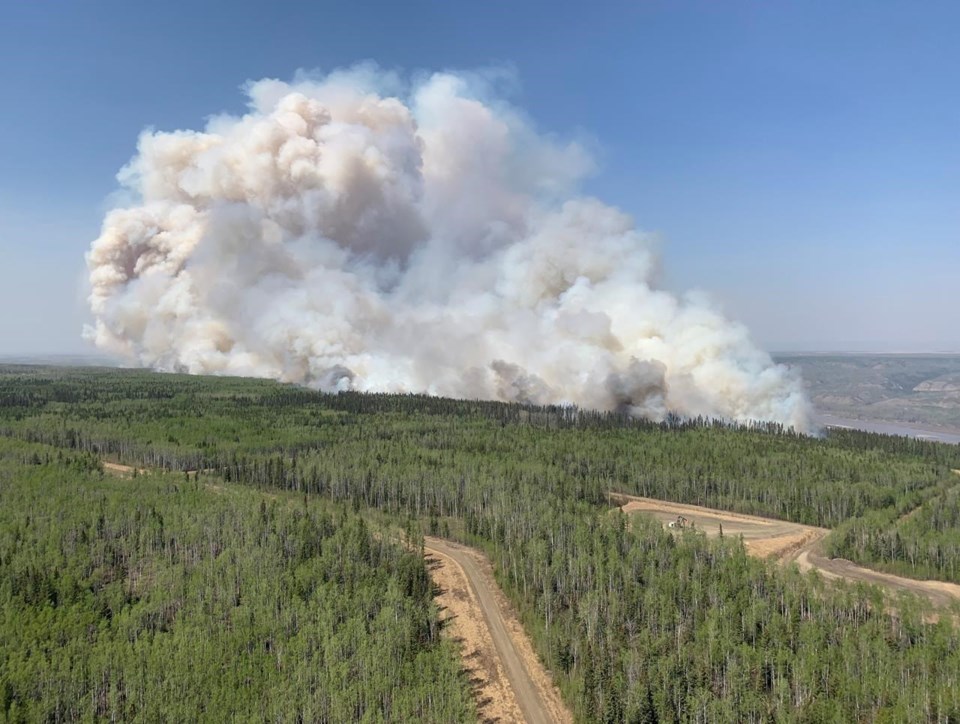CALGARY — Oil and gas producers in Alberta are temporarily shutting in production as wildfires rage across the energy-producing province.
With more than 100 active fires burning across Alberta and a provincial state of emergency in place, companies with operations in the western and northwestern parts of the province have pulled workers out and halted operations.
Crescent Point Energy Corp., which has significant operations in the Kaybob Duvernay light oil play, said Monday it has temporarily shut in production of approximately 45,000 barrels of oil equivalent per day in the affected areas.
"This precautionary measure is being taken by the company to protect the safety of its staff, the community, environment and its assets," Crescent Point said in a news release.
Vermilion Energy Inc. has shut in about 30,000 barrels per day of production, while Paramount Resources Ltd. said on Sunday its operations in the Grande Prairie and Kaybob regions in Alberta are being affected and that it has temporarily curtailed about 50,000 barrels per day of production.
Tourmaline Oil Corp., Canada's largest natural gas producer, said Monday members of its staff and their families have been pulled out from certain facilities and homes in the Edson area. Tourmaline has shut down nine gas processing facilities in the region.
Cenovus Energy Inc. said in an email it has safely shut in production and brought plants down in some areas of its conventional business. The company later said in a press release that approximately 85,000 barrels of oil equivalent per day of production has been impacted in the company’s Rainbow Lake, Kaybob-Edson, Elmworth-Wapiti and Clearwater operating areas.
Pipeline company TC Energy Corp. said it has shut down two compressor stations on its Nova Gas Transmission Ltd. system, while Trans Mountain Corp. said it has deployed a perimeter sprinkler system at its Edson pump station as a protective measure.
The Trans Mountain pipeline itself, and the expansion project under construction, have not been affected.
The wildfire situation in Alberta is evolving rapidly and there are no official volume estimates for how much oil and gas production has been curtailed, said Rory Johnston, a Toronto-based energy analyst and founder of the Commodity Context newsletter.
While it's possible the number could already be as high as 185,000 barrels of oil equivalent per day, Johnston said, that's a much smaller impact than was felt as a result of the Fort McMurray wildfire in 2016
That event resulted in a temporary 14-per-cent decline of crude oil exports from Alberta as oilsands facilities had to be taken off-line and were not fully restored for several months.
According to the Canada Energy Regulator, the Fort McMurray wildfire in May 2016 resulted in oilsands production losses as high as one million barrels per day at the height of the disaster.
"This so far is being seen as temporary — it's not a replay of 2016," Johnston said. "But it is very dry, and there are wildfires all over the place. There's nothing to say this won't get worse."
Johnston added that he believes wildfire is becoming a significant risk to the Canadian oil and gas sector.
"Particularly as the oil industry continues to grow, so that it's covering a larger and larger area, and wildfire activity continues to increase," he said.
"I think some of this is going to be a perennial risk to the Canadian industry."
Other companies that have shut in production include Pipestone Energy Corp., which has temporarily curtailed approximately 20,000 barrels per day of production in the Grande Prairie area, and Kiwetinohk Energy, which has shut in the majority of its Placid operations "in response to downstream third-party interruptions" that are in proximity to the Alberta wildfires.
Whitecap Resources Inc. said Monday its operations in northern Alberta and in northeast British Columbia have been impacted by proactive shut-ins and third-party interruptions. The company said it is still assessing the impact to its second-quarter production volumes.
Baytex Energy Corp. says it has curtailed about 10,000 barrels of oil equivalent per day due to the shut-in of third-party infrastructure.
Pembina Pipeline Corp. says it has currently shut down its Saturn I and II gas plants at the Saturn Complex north of Hinton, Alberta, and the Duvernay Complex, west of Fox Creek, Alberta, with a combined processing capacity of 443 million cubic feet of natural gas per day.
NuVista Energy Ltd. has curtailed 40,000 barrels of oil equivalent per day of production in the Grande Prairie region.
Most of the affected companies have reported no damage to their infrastructure or assets so far. Vermilion Energy said its assessment to date indicates "minimal" damage to key infrastructure.
It is unclear when oil and gas companies will be able to resume operations in the affected areas.
Scotiabank analyst Jason Bouver said in a morning note to clients that Crescent Point alone could see its 2023 cash flow per share decrease by about four per cent due to the impacts of the fires, assuming that the company's Kaybob Duvernay production is shut in for the remainder of the second quarter.
This report by The Canadian Press was first published May 8, 2023.
Companies in this story: (TSX:VET, TSX:POU, TSX:CPG, TSX:CVE, TSX:TRP, TSX:WCP, TSX:BTE)
Amanda Stephenson, The Canadian Press



